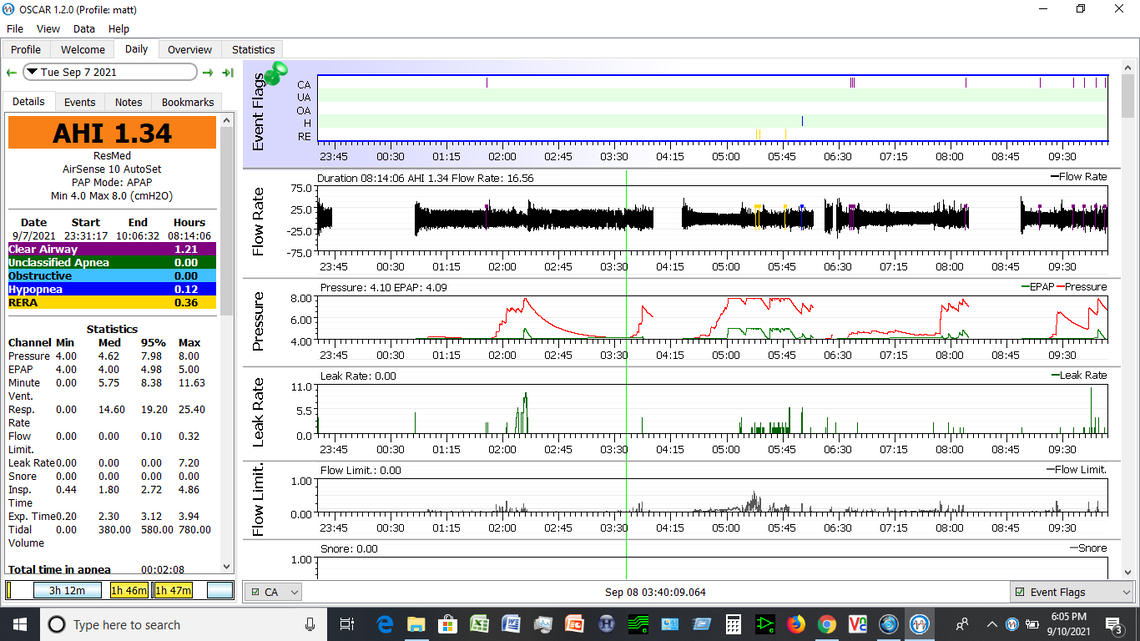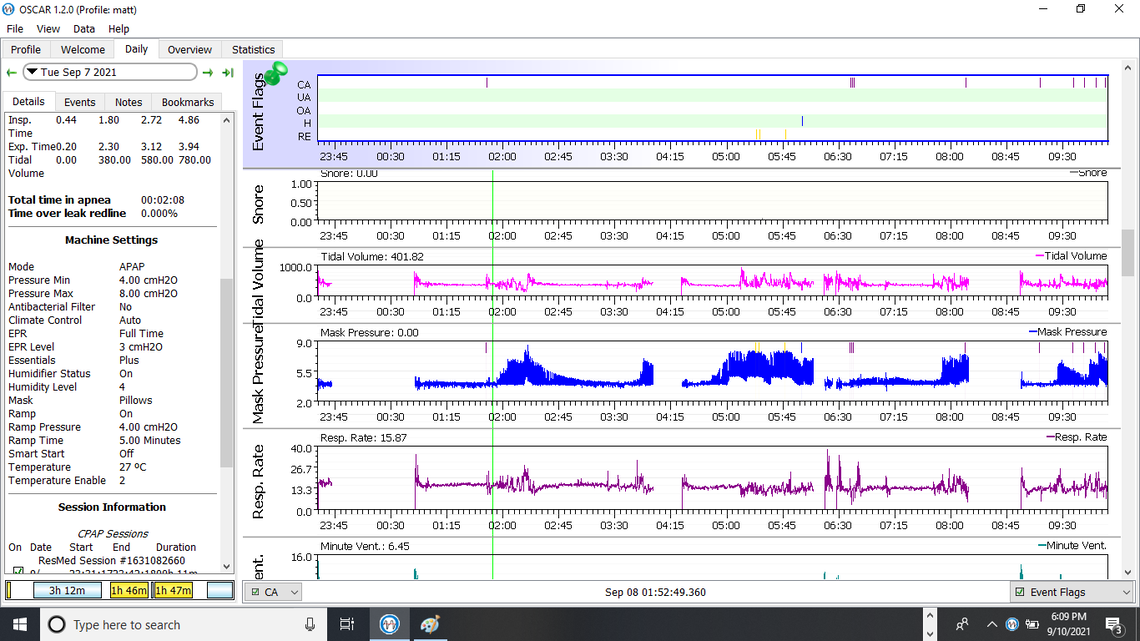Hello, I am new to this site and wanted to see if I could get some help. I was diagnosed with sleep apnea as well as insomnia earlier this year and it's been tough to start using the CPAP. I've recently made some progress and have been sleeping with the mask all night. My sleep is still pretty fragmented waking up a lot and I still have extreme daytime sleepiness as well as dizziness/brain fog, etc...
The AHI that the Resmed Auto10 reports is less than 2 but I've noticed that the apneas usually occur at a higher rate later in the morning before waking. Also my apnea is mild with an AHI of 8 but my RDI was 23 which is considered moderate. The Resmed basic report don't show that much detail and don't seem to have RERAs reported unless using Oscar.
I installed Oscar and am looking at it for the first time. So I'm looking for some guidance. My pressure is pretty low at 4 - 8. I don't seem to be having any OAs but instead it looks like there are some CAs with few reras and hypopneas. I'm also waking a lot so I'm wondering if there is something else waking me. The theory was that the apnea was causing arousals/awakenings. So I'm wondering if the detailed data shows anything else.
Would love some advice on what to start with in terms of what Oscar is showing, suggested setting adjustments... I think it makes sense to try to eliminate the CAs first. Maybe lower the max pressure but I've seen some other suggestions as well like modifying the EPR setting ...
Any advice is appreciated. I've posted a daily summary from Oscar. Two screenshots - it's the same thing but the 2nd one just shows the data that you couldn't see without scrolling. Let me know if any other screenshots are needed.
Thanks. -Matt


The first thing of importance, if this is a typical night, is that you have no OA or obstructive apnea events, and only one hypopnea. CPAP pressure is only helpful in reducing OA and H events, and perhaps to a lesser degree, RERA. Your main contributor to AHI are CA events. If anything more pressure can cause more CA events. Most of your CA events are happening when the pressure is higher, but there is one series of them at 6:45 or so, that are at low pressure.
Regardless I think the first thing I would try is lower pressure. I also suffer from CA events and I find that a fixed pressure can be better than an auto pressure setting. What you may want to try is switching from Auto mode to CPAP mode and reducing your pressure to 6 cm, and then possibly to 5 cm if OA and H events are still not a problem.
It is also possible you are not a candidate for a CPAP at all. The pressure of the CPAP may be causing more events than it is preventing.
Thanks Sierra. I will try the lower pressure and change to CPAP mode. When I do this, should I change the EPR setting - it's at 3cm right now full time. Should I change to ramp only? Or maybe try leaving this setting alone first so I'm not changing too many things at once?
Separately, in general, what's the best way to treat RERAs. Since my AHI was 8 and RDI was 23, the difference is RERAs I believe so I think that is my main problem (before using the CPAP and getting centrals). With the CPAP, I'm not seeing many RERAs but I'm not sure if that is because I am not getting any or the machine is not good at reporting them (or a combination of both). I do see one or two here or there but not many. It's unclear to me if this means they are being successfully treated or just not reported well. I guess I will see what happens when I lower the pressure. But I was just curious what the general approach is for someone with a lot of RERAs as the main issue.
Thanks.
On the EPR I would leave it as is for now. Find out what you get with only the pressure and mode change. Once you find out what that does, then you could try it as ramp only. I used to think EPR is not a big help other than for comfort, but more recently I have found that it does help reduce hypopnea for me. But, hypopnea was high for me, and it does not seem to be for you. I think the only way is to try it with and without to see.
The ResMed AirSense 10 For Her machine has a special mode which is supposed to be more effective in treating RERA. I think all it essentially does is increase pressure earlier in response to RERA events. It is kind of moot once you switch to CPAP fixed pressure mode. You have manually set the pressure higher and I would expect RERA events will be reduced already. I think about all you can do is make sure you have enough pressure to minimize the RERA events.
Providing you can minimize CA events I would try to keep the machine higher than the minimum 4 cm pressure. I find at 4 cm it can feel a little suffocating - not enough air. That may be causing you to wake up.